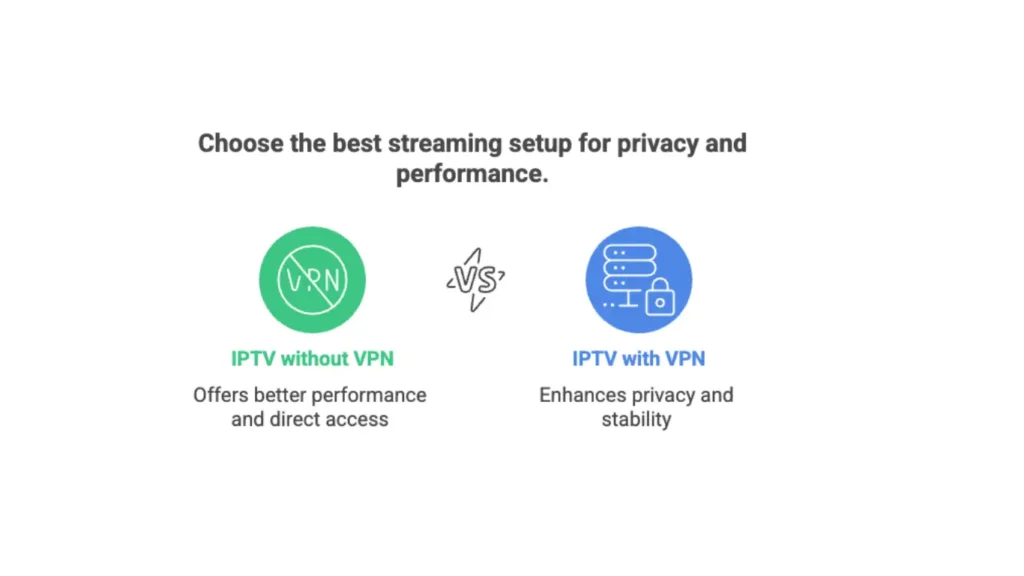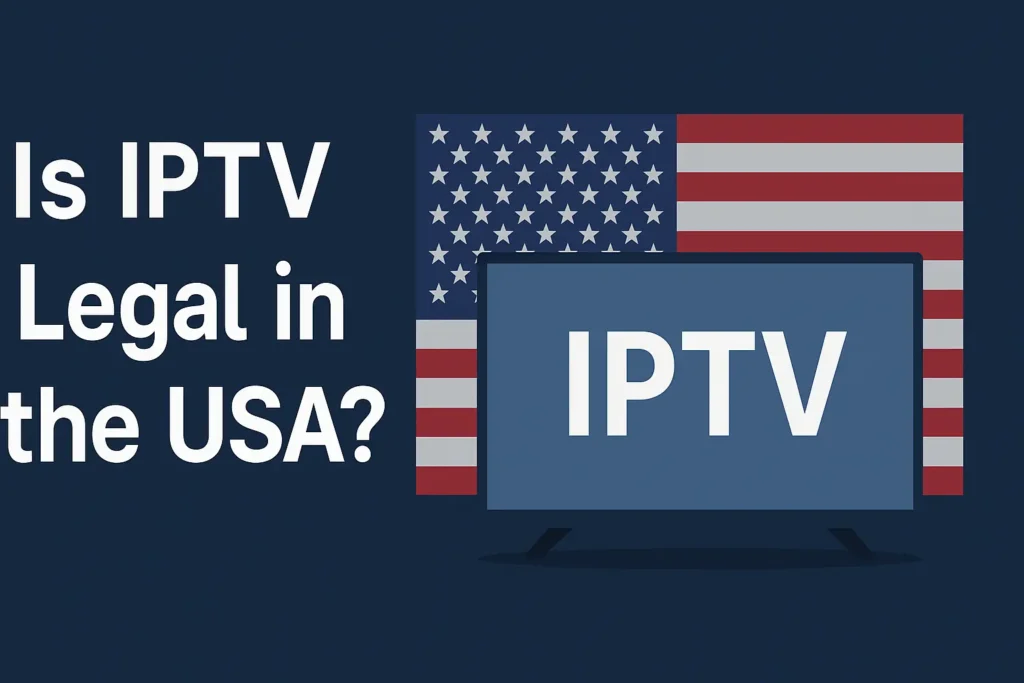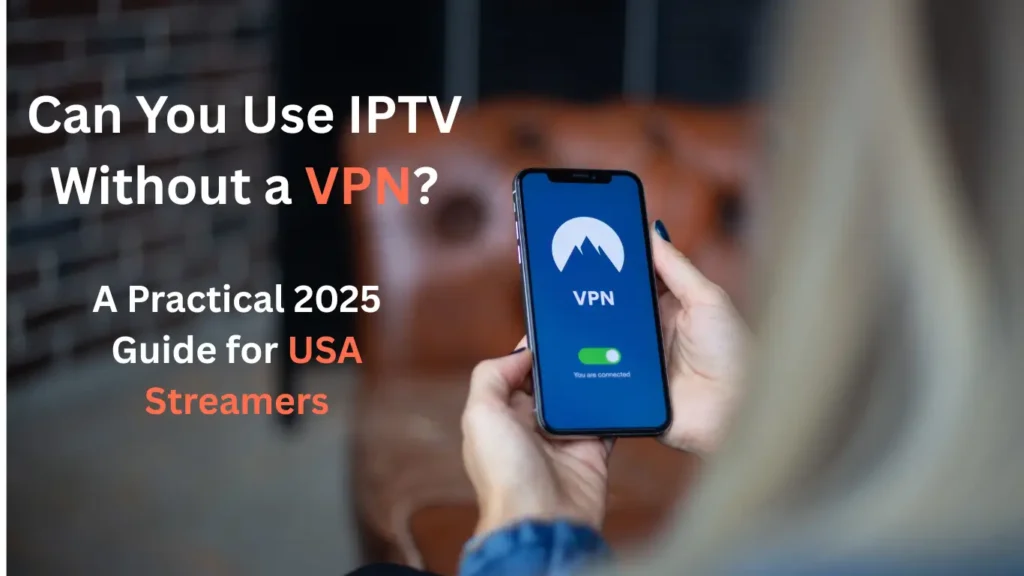Short answer: Yes you can use IPTV without a VPN in the United States. The real question is whether you should for your situation. This guide breaks down when going VPN-free makes sense, when a VPN is smart insurance, and how to keep things fast, private, and legal .
Author note: I watch IPTV on a Firestick and personally run NordVPN to keep my activity private and consistent. That said, many readers in the U.S. can stream perfectly fine without a VPN. Below I’ll help you decide which camp you’re in.
What “IPTV Without a VPN” Actually Means
When you stream IPTV without a VPN:

- Your ISP sees connection metadata (destination IPs, timing, volume). They typically can’t see encrypted video content, but they can see where you connect and how much you stream. The EFF explains that a VPN hides your destinations from the ISP (they only see you connect to the VPN), but you then trust the VPN with that visibility instead. Electronic Frontier Foundation+1
- Apps and services see your real location (IP-based), which affects geo-locked content and can trigger “VPN/proxy” errors if you flip a VPN on and off.
- Performance can be excellent because there’s no extra encryption hop. A VPN adds overhead (usually small with modern protocols), which can matter on slower connections or older devices.
A VPN boosts privacy and sometimes stability, yet can complicate geo-rights and occasionally trigger app blocks.
Is It Legal to Use IPTV (and VPNs) in the USA?
- VPNs are legal in the U.S. (what you do through them must be lawful). Mainstream resources reiterate this, and U.S.
- IPTV is a neutral technology. It’s legal when the provider has proper content rights (,YouTube TV, etc…). The illegality arises when a service distributes content without a license.
The USA Net Neutrality Reality (2025): Why It Matters for Buffering & Throttling
A quick backdrop:
- In April 2024, the FCC voted to restore federal net-neutrality rules (no blocking/throttling/paid fast lanes).
- In January 2025, a federal appeals court struck those rules down, saying the FCC lacked authority so there’s currently no federal net-neutrality rule. Some states (e.g., California) still enforce their own strong protections.
Why you care:
Without federal net-neutrality, some ISPs may shape video traffic in certain regions (especially mobile). Past research documented widespread video throttling on wireless networks, even off-peak. State laws (e.g., California) can limit this, but rules vary. A VPN can sometimes mask traffic type enough to avoid over-eager shaping though this isn’t guaranteed or universal.
So… Can You Use IPTV Without a VPN? Yes. Here’s When It Makes Sense.
You’re Using a Legit, U.S.-Licensed IPTV Provider
If your provider is licensed for the channels you watch, you’re already on the right side of the rules VPN or not.
If you use IPTV with adult content, you should use a VPN for your privacy.
You Live in a State with Net-Neutrality Protections
If you’re in California (and a few other states with policies or procurement rules), ISPs are restricted from throttling lawful content. A no-VPN setup often performs great here.
Your Connection Is Fast and Stable
If you’ve got solid bandwidth (100–500 Mbps) and a modern router, going VPN-free minimizes overhead, often delivering the lowest latency and highest peak bitrate.
You Don’t Need to Mask Your IP or Location
If your provider is region-agnostic (or specifically U.S.-focused), and you don’t care to obfuscate your IP, skipping the VPN keeps things simple.
When a VPN Helps (Even If Not Strictly Required)
Privacy From ISPs and Public Wi-Fi Owners
A VPN hides the destinations you visit from your ISP or coffe/hotel network owners. U.S. consumer agencies (FTC) have issued guidance on choosing reputable VPN apps—good reading if you care about privacy.
Avoiding Over-Aggressive Traffic Management
In places without net-neutrality or on certain mobile carriers, a VPN can sometimes prevent automated video throttling from kicking in and smoothing out streams. (Results vary by ISP and network.)
Security on Travel Wi-Fi
If you watch on hotel/Airbnb Wi-Fi, a VPN is a smart baseline to reduce snooping risks (per NSA/CISA’s general remote-access guidance).
Consistency Across Apps
Some video apps block known VPN ranges but for services that don’t, a VPN can stabilize routing paths during ISP congestion.
My Setup on Firestick (Personal Experience)
I stream IPTV on a Firestick and I personally run NordVPN on it because I value privacy and like keeping my ISP from profiling my video habits. NordVPN offers a native Fire TV app (good news: most Fire TV devices support VPN except the first-gen Fire Stick). Install from the Amazon Appstore, sign in and connect before launching your player. NordVPN Support+1
Comparison: IPTV With vs. Without a VPN (USA)
| Scenario | Without VPN (Pros/Cons) | With VPN (Pros/Cons) | Why This Happens |
|---|---|---|---|
| Privacy | Fewer moving parts. ISP sees destinations/volume | ISP can’t see where you connect. You now trust the VPN | VPN encrypts traffic and masks destinations from the ISP. |
| Speed/Latency | Often fastest path. Possible shaping in some regions | Can bypass some shaping. Slight overhead | Some ISPs treat video traffic differently; VPN may circumvent heuristic throttling. |
| Geo-locks | Native region catalog. No region spoofing | Optional region change. Apps may block VPN IPs | Big streamers detect and block VPNs. |
| Simplicity | Nothing extra to manage | Extra app, sign-in, updates | VPN adds complexity; use only if it brings benefits you value. |
| Security on Public Wi-Fi | Owner can monitor metadata | Encrypted tunnel shields traffic | Government guidance endorses choosing reputable, secure VPNs. |
Legal, Safe & Smooth: A No-VPN Checklist (USA)

If you decide to go without a VPN, follow this:
- Use a licensed provider. Make sure your IPTV provider uses licensed content.
- Mind your state rules. In California and some states, net-neutrality protections reduce throttling risk. Elsewhere, your mileage may vary.
- Harden your home network.
- Use Ethernet where possible (Fire TV + adapter) or 5 GHz Wi-Fi.
- Place your IPTV device close to the router
- Update firmware (router + Firestick).
- Pick the right player/app. Keep it updated and match stream format to device capability (e.g., 4K HEVC on 4K devices).
- Avoid public Wi-Fi for IPTV : Always connect from a private or trusted Wi-Fi.
- Know the signs of shaping. If evenings are suddenly buffer-y but mornings are smooth, your ISP may be queue-managing video. A trial with a reputable VPN can help you check .
Decision Framework: Do You Need a VPN for IPTV?
If most boxes below are “Yes,” you can likely go VPN-free:
- You use a U.S.-licensed IPTV provider.
- Your streams are stable at peak times.
- You don’t need region spoofing.
- You mostly stream at home on your own network.
Consider a VPN if any of these are true:
- You want to reduce ISP visibility of what you watch and when.
- You suspect traffic shaping in your area.
- You often stream on public Wi-Fi (travel, hotels).
- You prefer consistent routing during congestion (sometimes improves stability).
- You want location control (knowing some apps will block VPNs)
Firestick How-To (2 Paths)
No VPN (Fastest Path)
- Update Fire OS and your player app.
- Use 5 GHz Wi-Fi or Ethernet adapter.
- Reboot router weekly; enable QoS if available.
With VPN (Privacy Path)
- Install a reputable VPN app from the Amazon Appstore (e.g., NordVPN’s Fire TV app). Note: the first-gen Fire Stick doesn’t support VPN connections.
- Sign in and connect, then open your IPTV app.
- If an app complains about a VPN, switch servers or disable for that app (split tunneling if supported).
Table: Common Questions (USA, 2025)
| Question | Quick Answer |
|---|---|
| Is IPTV legal? | Yes, when the provider has rights to the content. Technology is legal; unauthorized distribution is not. |
| Are VPNs legal? | Yes in the U.S. It’s what you do through them that matters. |
| Can my ISP see what I watch without a VPN? | They see connection metadata (destinations, volume), not decrypted video content. A VPN hides destinations from the ISP but shifts trust to the VPN. |
| Will a VPN fix all buffering? | Not always. It can help if throttling/path issues cause the slowdown; otherwise it may not change much. |
| Do streaming apps block VPNs? | Many do (e.g., Netflix), which can limit catalogs or trigger errors. |
Conclusion: You Don’t Need a VPN for IPTV—But It’s Smart in Specific Cases
- If you’re on a licensed IPTV provider, have solid speeds and live where ISPs don’t meddle much, you can absolutely stream without a VPN.
- If you value privacy, stream on public Wi-Fi, suspect throttling, or want more consistent routing, a VPN is worth testing.
- My personal choice (NordVPN on Firestick) reflects a privacy preference, not a legal requirement. Your ideal setup is the one that keeps streams smooth, your data private, and your content legal.
About the Author
I’m Alex, and I’ve been using IPTV for several years. Over time, I’ve gained hands-on experience with everything from setup to ensuring privacy. I share my knowledge and tips with streamers to help enhance their viewing experience making streaming smoother, safer and more enjoyable.

